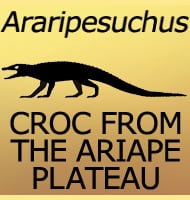In Depth
Based upon fossil remains first discovered in 1980, Xenotarsosaurus was named because of the complete fusion between the astragalus and calcaneum bones of the ankle, something that is quite unusual for a theropod dinosaur. At the time of the original description, the rear leg of Xenotarsosaurus was shown to share some similarities with the better known Carnotaurus, logically leading to the identification of Xenotarsosaurus as an abelisaurid. However a 1989 study Coria et al. led to an alternative notion that Xenotarsosaurus may in fact be an indeterminate neoceratosaurian theropod. Additionally at the time of its original description, Xenotarsosaurus was thought to come from the Campanian of the Cretaceous, but a later re-assessment of the Bajo Barreal Formation now means that Xenotarsosaurus actually lived during the Cenomanian/Turonian stages of the Cretaceous.
Xenotarsosaurus was likely one of the principal predators of the Bajo Barreal Formation, with possible prey species including the hadrosaurid Secerosaurus, and titanosaurian sauropods like Drusilasaura.
Further Reading
- Xenotarsosaurus bonapartei nov. gen. et sp. (Carnosauria, Abelisauridae), un nuevo Theropoda de la Formacion Bajo Barreal, Chubut, Argentina - Ricardo Mart�nez, Olga Gim�nez, Jorge Rodr�guez & Graciela Bochatey - 1986. - Sobre Xenotarsosaurus bonapartei Mart�nez, Gim�nez, Rodr�guez y Bochatey, 1986; un problematico Neoceratosauria (Novas, 1989) del Cret�cico de Chubu - R.A. Coria & J. Rodr�guez - 1993. – Allometry and body length of abelisauroid theropods: Pycnonemosaurus nevesi is the new king. – Cretaceous Research. 69: 71–89. – O. N. Grillo & R. Delcourt – 2016









